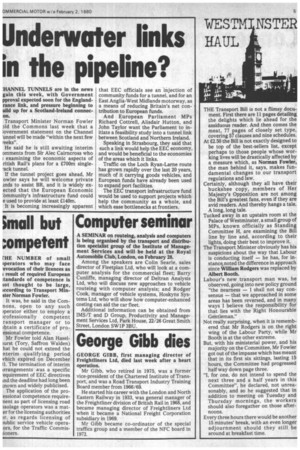WESTM NSTER HAUL
Page 7

If you've noticed an error in this article please click here to report it so we can fix it.
THE Transport Bill is not a flimsy document. First there are 11 pages detailing. the delights which lie ahead for the assiduous reader. And then comes the meat, 77 pages of closely set type, covering 57 clauses and nine schedules.
At E2.50 the Bill is not exactly designed to be top of the best-sellers list, except perhaps to those people whose working lives will be drastically affected by a measure which, as Norman Fowler, the man behind it, says, makes fundamental changes to our transport regulations and law. Certainly, although they all have their buckshee copy, members of Her Majesty's Opposition are not among the Bill's greatest fans, even if they are avid readers. And thereby hangs a tale. A long, long tale. Tucked away in an upstairs room at the Palace of Westminster, a small group of MPs, known officially as Standing Committee H, are examining the Bill line by line and, according to their lights, doing their best to improve it. The Transport Minister obviously has his suspicions about the way that Labour is conducting itself — he has, for instance,noted the difference in approach since William Rodgers was replaced by Albert Booth.
Labour's new transport man was, he observed, going into new policy ground "the nearness — I shall not say consensus — that we approached in some areas has been reversed, and in many ways I believe the responsibility for that lies with the Right Honourable Gentleman."
Not really surprising, when it is remembered that Mr Rodgers is on the right wing of the Labour Party, while Mr Booth is at the other extreme.
But, with his ministerial power, and his majority on the Committee, Mr Fowler got out of the impasse which has meant that in its first six sittings, lasting 15 hours, the Committee had progressed half way down page three. "I, for one, do not intend to spend the next three and a half years in this Committee", he declared, not unreasonably, and so he suggested that in addition to meeting on Tuesday and Thursday mornings, the workers should also foregather on those afternoons.
Every three hours there would be another 15 minutes' break, with an even longer adjournment should they still be around at breakfast time.








































































































































